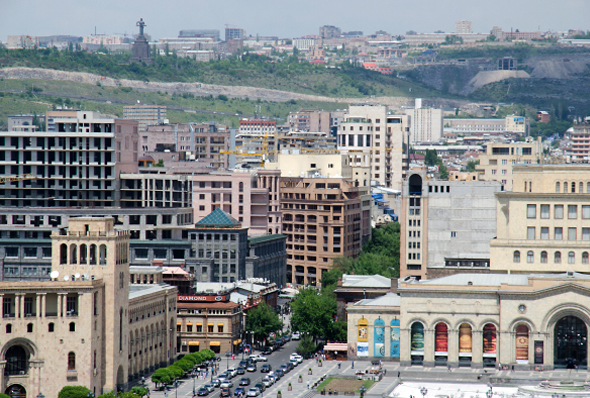Armenia's Construction Boom: 20% Growth Masks Licensing Stranglehold and Monopoly Whispers

Armenia's Construction Boom: 20% Growth Masks Licensing Stranglehold and Monopoly Whispers
In a nation where Soviet-era concrete skeletons still dot the skyline, Armenia's construction sector is defying gravity. Official figures paint a picture of robust expansion: output surged 26.1% year-on-year in July alone, capping a first-half performance that clocked in at over 20% growth. Yet, beneath this edifice of progress lurks a troubling paradox. Whispers among hard-hatted workers echo rumors of a shrinking industry, squeezed by draconian new licensing rules that have slashed the number of active construction firms. Even veterans with three decades of on-site grit find themselves barred from the game—unless they've already helmed a company. Is Yerevan's government, in a bid for modernization, inadvertently—or deliberately—fostering a monopoly in one of its hottest economic engines?
A Sector on Steroids: The Numbers Don't Lie
Armenia's construction renaissance isn't hype; it's hard data. In the first seven months of 2025, the sector's value ballooned to 293.3 billion Armenian drams (roughly $760 million), a 20.2% leap from the prior year. June alone saw a 22.6% uptick, with July accelerating to 26.1%—the fastest clip since April 2021. This isn't isolated froth; it's woven into the national fabric, propping up GDP growth to 7% through July and fueling ancillary booms in services and trade.
| Month/Period | Growth Rate (YoY) | Value (AMD Billion) |
|--------------|-------------------|---------------------|
| January-July 2025 | 20.2% | 293.3 |
| June 2025 | 22.6% | 59.4 |
| July 2025 | 26.1% | N/A |
| Q2 2025 (GDP from Construction) | N/A | 139.5 |
*Sources: Statistical Committee of Armenia, Trading Economics, Eurasian Development Bank*
What’s driving this? Urbanization fever in Yerevan and diaspora-fueled remittances are pouring concrete into residential towers and commercial hubs. Government housing programs, like those revitalizing border settlements, have extended eligibility for permits issued before September 2024, injecting fresh momentum. Yet, as cranes pierce the capital's haze, the ground-level narrative tells a different tale.
The Licensing Labyrinth: Barriers for the Battle-Tested
Enter the villains of this boom: Yerevan's regulatory revamp. Since late 2023, the government has rolled out a tiered licensing system for construction firms, mandating re-certification by September 2024. Bachelor's degree holders need five years of uninterrupted experience; master's grads, just three. But here's the rub—a clause buried in the fine print demands prior company ownership for certain high-stakes licenses, effectively sidelining solo experts or long-time employees without entrepreneurial pedigrees.
This isn't bureaucratic trivia; it's a chokehold. Applications for building permits flipped fully digital on January 1, 2025, via the urban.e-gov platform, aiming to slash red tape and align with EU standards. State duties for permits have spiked "several times over," per recent tax tweaks, while urban planning regs now mandate technical documentation that rivals a PhD thesis. The result? A reported "massive decrease" in licensed entities, as small operators—often the nimble ones employing local laborers—fold under the weight.
One anonymous foreman with 30 years pouring foundations in Gyumri shared his plight: "I've built half the town's schools, but without a defunct firm's name on my resume? No license. No work." Such stories fuel site-side scuttlebutt: the industry's "getting smaller," with layoffs rippling through crews. Official tallies on firm counts remain elusive, but the anecdotal deluge suggests a consolidation wave, where only deep-pocketed players thrive.
Rumors in the Rubble: Shrinkage vs. Surge
On dusty job sites from Vanadzor to Spitak, the vibe is gloomier than the stats suggest. Workers murmur of ghost projects and idle trowels, pinning the blame on a "ban" that locks out the un-anointed. Social media echoes faint global parallels—Ukraine's mortgage crunch, Iceland's flat slowdown—but Armenia-specific chatter is sparse, confined to Telegram groups and café corners. One thread on local forums buzzes with claims of a 40% permit drop in late 2024, mirroring broader Eastern European jitters.
Yet, the aggregate output mocks these moans. How can volumes vault 20% if firms are fleeing? The answer lies in scale: Fewer, larger outfits are gobbling market share, leveraging economies that small fry can't touch. This isn't organic Darwinism; it's policy-preserved.
Monopoly by Design? Yerevan's High-Stakes Gamble
So, is Armenia's government engineering a cartel? The charge isn't new—Armenia's economy has long nursed monopolies in telecoms and energy, with the World Bank once dubbing it the region's "monopoly nest." Construction, however, was a rare meritocracy. Now, with re-licensing favoring incumbents and duties deterring newcomers, critics spy a squeeze play. Anti-monopoly laws exist on paper—the Law on Protection of Economic Competition polices cartels—but enforcement lags, especially in a sector buoyed by state contracts.
Proponents counter: These rules aren't sabotage; they're safeguards. EU alignment demands rigor to curb shoddy builds that plagued post-Soviet sprawl. Digital permits cut corruption (a perennial Armenian scourge), and categorization weeds out fly-by-nights. Growth persists because survivors are stronger—think quality over quantity. But at what cost? If experience trumps paperwork, innovation stalls, and rural workers wither.
Worse, this feels like monopoly 2.0: subtler than outright bans, but no less corrosive. Past regimes crushed dissent with tanks; today's wield spreadsheets, quietly centralizing power in a handful of oligarch-friendly giants.
Building Toward What? A Call for Clarity
Armenia's construction paradox—20% ascent amid whispers of atrophy—forces a reckoning. The sector's vitality is undeniable, a beacon in a 5.9% GDP glow-up. But if licensing locks out the lifers, it risks ossifying into an elite enclave, where growth benefits boardrooms over backhoes.
Yerevan must clarify: Is this pruning for prosperity or paving for plutocrats? Exemptions for proven pros, streamlined appeals, and transparent firm counts could quiet the rumors. Otherwise, the real collapse won't be in permits—it's in public trust.
As one Yerevan engineer quipped over black coffee: "We're building castles in the air. But without a ladder for everyone, who'll climb?" In Armenia's rising edifice, that's the foundation worth inspecting.
